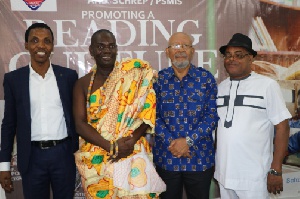 From left: Justice Essiel, Eric Appiah, Anis Haffar - the writer and Theophilus Kwei
From left: Justice Essiel, Eric Appiah, Anis Haffar - the writer and Theophilus Kwei
Aldous Huxley (1894 – 1963) wrote: “Every man who knows how to read has it in his power to magnify himself, to multiply the ways in which he exists, to make his life full, significant and interesting.” Warren Buffett must have taken the above advice not only literally but strategically. He was once asked, “How do you get your ideas?” He answered, “I just read. I read all day.”
From his reading habits, Buffett found ways to “magnify himself” and to “multiply the ways” for impressive financial profits, to become one of the richest men on the planet. Asked about Buffett’s reading habits, the Microsoft billionaire, Bill Gates confirmed that Buffett is “a creature of habits … He likes to sit in his office and read and think. There are a few things he’ll do beyond that, but not many.”
GNAPS theme for 2018
It was such an honour when Justice King Essiel, general secretary of the Ghana National Association of Private Schools (GNAPS), asked me to chair the launching of 2018 annual week celebration and speak to the theme “Promoting a reading culture: A key to the information age”, at the British Council 22nd February, 2018.
In justifying the theme, Mr Eric Appiah, the president of GNAPS, said, “The government of Ghana continues to take practical steps to remove barriers that impede access, equity and quality; however, it is increasingly becoming necessary to visit one of the most important outcomes of education, which is reading with critical thinking which our language policy seeks to address.”
He was concerned that “Although we are in an era where search engines such as Google, Kindle, to mention a few, provide unlimited information about anything and everything … we can hardly count schools in our country which allow student access to the internet … We cannot afford to keep our children in ignorance whiles we live in a world where knowledge abounds.”
One District, One E-Library project
Mr Appiah suggested the need to develop a national reading programme at the basic school level to augment the USAID reading project to make it mandatory to read particular books of significance. He said, “Another point worth considering is the establishment of E-Libraries in the 216 districts in Ghana” sited in places that are accessible to all learners of all reading levels. The GNAPS president proposed that government makes it one of its flagship projects, namely, One District, One E-Library Project.
Mr Theophilus Kwei, the Greater Accra Regional Chairman of GNAPS was concerned that all schools across the country focus on delivering the best for the Ghanaian child through teachers’ training and innovation especially in this era of digitalisation.
Reading for pleasure
In my presentation, I noted one of the most rewarding courses I ever taught in the United States – in the 1980s – titled simply, “Reading”. In the guidelines for instruction, the philosophy behind the course run like this:
The ability of students to use “reading process skills effectively is essential to educational achievement in all subject areas. It is important for the development of individual talents and interests as well as for participation in a society which relies on the printed word as a prime means of communication. Equal educational opportunity is only attainable when students have been provided with a level of reading skills instruction commensurate with the demands placed upon all in the content classes.”
In other words, the success or achievement in every single subject studied depended on one’s ability to read and understand what one read. That course was to change my life in the sense that as a teacher of Reading, I had to model the interest in reading myself every Reading period. I invested in books. The challenge turned out to be a bonanza for me where I chose a reading list every week, a reading list of interest to me personally. And the same with each student, as they too chose their own reading lists – according to their abilities and interests – for the week, reading through the hour every period.
The 5 Ws to check understanding
Though supporting reading for pleasure and not for examinations, I introduced a simple way to have students share their interests by speaking to their choices and selections occasionally. Firstly, they ran a reading log by simply filling in a template in a notebook with: Number #, Date, Title, Author, Page Begin, Page End. Secondly, for a Closure Activity for reflective purposes, they ran another log responding to the following five “W” prompts as necessary or as applicable:
Who: persons, people; When: time, setting; What: objects, things, meaning; Why: reason, intent, purpose; Where: place, setting. Responses to those prompts set the tone for talking points and clear thinking when occasionally we engaged in conversations about the books we had each read.
Simple but effective structure allows students to think, formulate their understanding of content, and reflect on their reading with as much precision as possible, and allowing them to become critical thinkers. That process also allows follow up questions such as: What book, topic, theme, or author will you like to consider reading next? Once hooked intellectually to what is meaningful and purposeful, children become life long learners. The mind is a terrible thing to waste, and it’s every discerning adult’s responsibility to support the nation’s children and youth to excel.
Email: anishaffar@gmail.com